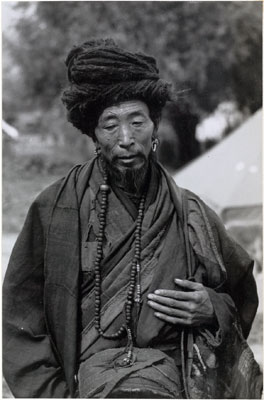
BMR.86.1.39.3 (Album Print black & white)


BMR.86.1.39.3 (Album Print black & white)

Frederick Spencer Chapman
Hugh E. Richardson
September 8th 1936
Lhasa
BMR.86.1.39.3
Print gelatin silver
British Diplomatic Mission to Lhasa 1936-37
Donated to the British Museum in 1986 by Hugh E. Richardson
C.4.16 [view film roll]
F. S. Chapman Collection in the Pitt Rivers Museum
1998.131.237.1
Technical Information - This image seems to be a duplicate negative made at a later date than those of the mission. This is because of the size of the negative, which is significantly larger than the largest quarter-plate sized negatives that Chapman stated that he used whilst in Lhasa [see Chapman's book Lhasa The Holy City, London: Chatto & Windus, 1938; reprint, London: Readers Union Ltd., 1940, p.146 for a description of the still and cine cameras that he used as Mission photographer]. Furthermore, the negative has none of the tonal qualities of the negatives used in Lhasa and is of a significantly different make, resembling the thick negatives used to make dupe negatives [MS 16/03/2006]
Manual Catalogues - Caption in Chapman's hand-written list of negatives made whilst on the Mission to Lhasa, 1936-7 [See PRM Manuscripts Collection]: 'Close up of beggar with turban and big drum'; 'PRM Manuscripts Collection: ‘List of Tibetan Prints and Negatives’ - Book 2: ‘26/2 - A monk who has taken a vow never to cut his hair’ [MS 16/03/2006]
Other Information - Related Images: Images prefixed with 'C.4.' comprise a group of negatives containing images of soldiers, turning prayer wheel, horns and rock paintings, paintings, Dr Morgan and mission hospital, beggar with skull and drum, monks outside Sera, meat seller and water tanks. They all seem to have been taken on or around September 8th 1936 [MS 16/03/2006]
Other Information - Related Images: This person is seen standing in a group in 1998.131.236 [MS 21/3/2005]
For Citation use:
The Tibet Album.
"Itinerant monk"
05 Dec. 2006. The British Museum.
<http://tibet.prm.ox.ac.uk/photo_BMR.86.1.39.3.html>.
For more information about photographic usage or to order prints, please visit the The British Museum.
© The British Museum